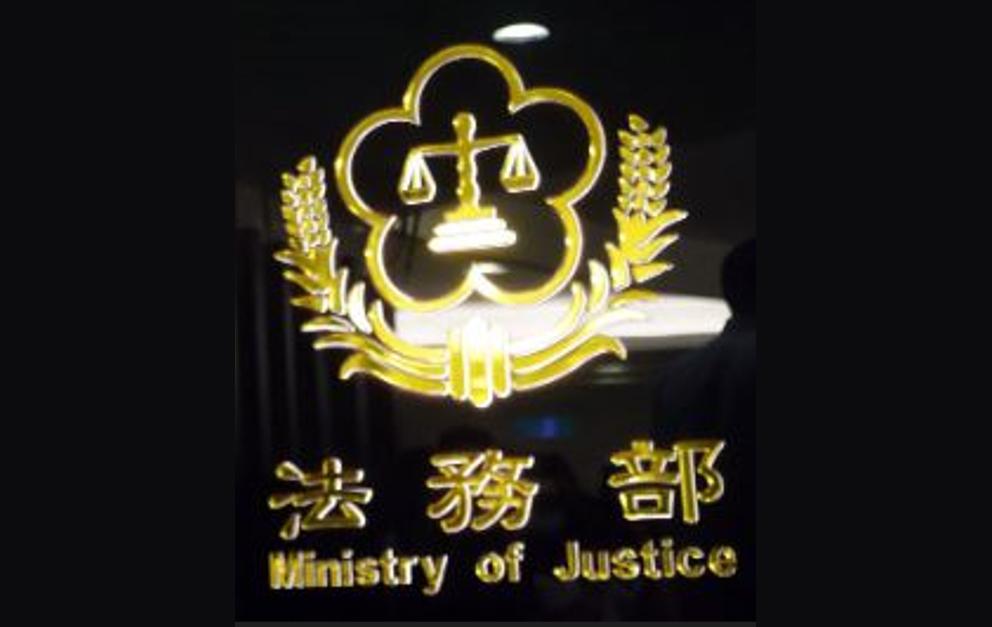Authorities have detained 40 people on charges of interfering with voting rights, the Ministry of Justice said yesterday, adding that nine are suspected of helping a foreign power to meddle in next month’s presidential and legislative elections.
The Supreme Prosecutors’ Office launched an investigation amid a sweep targeting election fraud across the nation, Department of Prosecutorial Affairs official Kuo Yung-fa (郭永發) told a Cabinet meeting in Taipei.
The ministry conducted the operation in collaboration with the Central Election Commission and the Ministry of the Interior, Kuo said.

Photo: CNA
As of Tuesday, prosecutors had issued 15 indictments for alleged election interference and 17 for alleged contraventions of the Anti-Infiltration Act (反滲透法), with nine people named as suspects, a justice ministry report showed.
The indictments might be linked to reports that Beijing organized trips to China for local officials.
Other indictments were issued in two cases of alleged vote-buying, two cases of election-related disinformation, 37 cases of illicit foreign campaign financing and eight cases of gambling on vote outcomes, the report said, adding that NT$27.5 million (US$877,753) had been confiscated in the gambling cases.
Prosecutors have also detained 35 people and confiscated NT$2.35 million and a NT$3.5 million car in an alleged case of cash for petition signatures, the report said.
The act forbids conducting electoral activities on behalf of a hostile foreign power, Deputy Minister of Justice Huang Mou-hsin (黃謀信) told a news conference following the Cabinet meeting.
The law also mandates enhanced sentencing for breaking election laws if they are for a foreign power, Huang said.
In other news, a report by cyberintelligence company Graphika said that an online public opinion manipulation scheme favored the Chinese Nationalist Party (KMT).
Graphika said in the report published yesterday that it detected “a sustained and coordinated effort to manipulate online conversations about Taiwanese politics” that began as early as May last year.
The team did not attribute the campaign to a specific actor, but the tactics, techniques and procedures used were characteristic of an online influence operation, it said.
The operation used more than 800 Facebook accounts, 13 Facebook groups, one YouTube channel and one TikTok account to spread political memes and videos targeting the Democratic Progressive Party’s (DPP) presidential candidate, Vice President William Lai (賴清德), and others, it said.
The operation revolved around material generated by an online persona called “Agitate Taiwan” (鼓動台灣) on TikTok and a now-defunct YouTube channel, it said.
The inauthentic accounts used stolen or digitally manipulated images in their profiles, generated content with nearly the same timestamp, it said, adding that metadata showed their TikTok links were generated during a single browser session.
Additionally, several of the Facebook accounts posted check-ins at identical coordinates in Taichung, Graphika said.
The operation generated and amplified content that focused on debunked allegations that children were drugged at a kindergarten, reports of egg shortages and compaints about Medigen’s COVID-19 vaccines in a bid to depict the DPP as corrupt or incompetent, it said.
However, authentic engagement with the content was scant, it added.
Additional reporting by Chung Li-hua

SECURITY: As China is ‘reshaping’ Hong Kong’s population, Taiwan must raise the eligibility threshold for applications from Hong Kongers, Chiu Chui-cheng said When Hong Kong and Macau citizens apply for residency in Taiwan, it would be under a new category that includes a “national security observation period,” Mainland Affairs Council (MAC) Minister Chiu Chui-cheng (邱垂正) said yesterday. President William Lai (賴清德) on March 13 announced 17 strategies to counter China’s aggression toward Taiwan, including incorporating national security considerations into the review process for residency applications from Hong Kong and Macau citizens. The situation in Hong Kong is constantly changing, Chiu said to media yesterday on the sidelines of the Taipei Technology Run hosted by the Taipei Neihu Technology Park Development Association. With

CARROT AND STICK: While unrelenting in its military threats, China attracted nearly 40,000 Taiwanese to over 400 business events last year Nearly 40,000 Taiwanese last year joined industry events in China, such as conferences and trade fairs, supported by the Chinese government, a study showed yesterday, as Beijing ramps up a charm offensive toward Taipei alongside military pressure. China has long taken a carrot-and-stick approach to Taiwan, threatening it with the prospect of military action while reaching out to those it believes are amenable to Beijing’s point of view. Taiwanese security officials are wary of what they see as Beijing’s influence campaigns to sway public opinion after Taipei and Beijing gradually resumed travel links halted by the COVID-19 pandemic, but the scale of

A US Marine Corps regiment equipped with Naval Strike Missiles (NSM) is set to participate in the upcoming Balikatan 25 exercise in the Luzon Strait, marking the system’s first-ever deployment in the Philippines. US and Philippine officials have separately confirmed that the Navy Marine Expeditionary Ship Interdiction System (NMESIS) — the mobile launch platform for the Naval Strike Missile — would take part in the joint exercise. The missiles are being deployed to “a strategic first island chain chokepoint” in the waters between Taiwan proper and the Philippines, US-based Naval News reported. “The Luzon Strait and Bashi Channel represent a critical access

Pope Francis is be laid to rest on Saturday after lying in state for three days in St Peter’s Basilica, where the faithful are expected to flock to pay their respects to history’s first Latin American pontiff. The cardinals met yesterday in the Vatican’s synod hall to chart the next steps before a conclave begins to choose Francis’ successor, as condolences poured in from around the world. According to current norms, the conclave must begin between May 5 and 10. The cardinals set the funeral for Saturday at 10am in St Peter’s Square, to be celebrated by the dean of the College